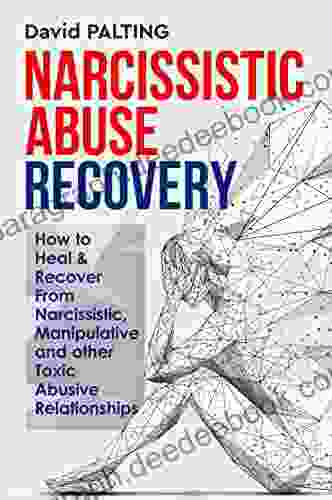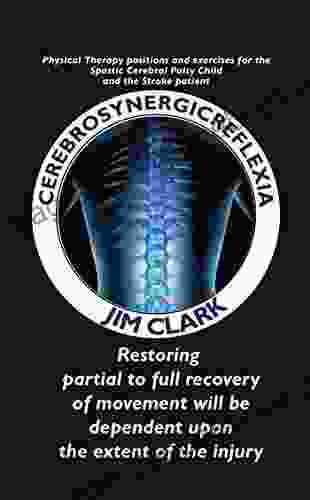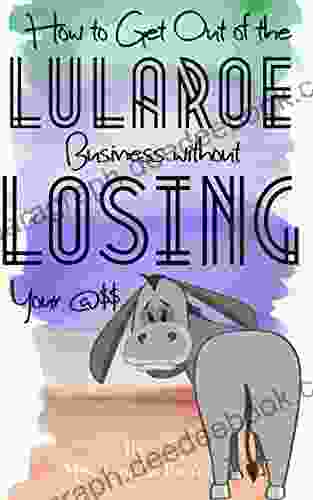How to Heal and Recover from Narcissistic, Manipulative, and Other Toxic Abusive Relationships

Toxic relationships can be incredibly damaging, leaving victims with emotional, psychological, and even physical scars. Narcissistic and manipulative abusers are particularly adept at causing harm, as they use their charm, charisma, and intelligence to control and dominate their victims.
4.7 out of 5
| Language | : | English |
| File size | : | 1049 KB |
| Text-to-Speech | : | Enabled |
| Screen Reader | : | Supported |
| Enhanced typesetting | : | Enabled |
| Word Wise | : | Enabled |
| Print length | : | 85 pages |
| Lending | : | Enabled |
| Paperback | : | 110 pages |
| Item Weight | : | 7.8 ounces |
If you have been involved in a toxic relationship, it is important to know that you are not alone. Millions of people are affected by abuse every year, and there is help available. This article will provide you with a comprehensive guide to healing and recovering from narcissistic, manipulative, and other toxic abusive relationships.
Types of Abuse
There are many different types of abuse, including:
- Emotional abuse involves verbal or nonverbal behavior that is intended to control, humiliate, or belittle the victim.
- Verbal abuse includes name-calling, insults, threats, and put-downs.
- Physical abuse involves any intentional physical contact that causes pain or injury.
- Sexual abuse includes any sexual activity that is not consensual or that is used to control or dominate the victim.
- Financial abuse involves controlling the victim's access to money or other financial resources.
- Spiritual abuse involves using religion or spirituality to control or manipulate the victim.
- Psychological abuse involves using psychological tactics to control or manipulate the victim.
- Mental abuse involves using mental health issues to control or manipulate the victim.
- Child abuse involves any physical, emotional, sexual, or psychological harm inflicted on a child.
- Domestic violence is a pattern of abusive behavior that occurs in a romantic or intimate relationship.
- Intimate partner violence is a type of domestic violence that occurs between current or former intimate partners.
- Dating violence is a type of intimate partner violence that occurs between two people who are in or have been in a romantic or dating relationship.
- Stalking is a repeated pattern of unwanted and uninvited contact that causes fear or distress in the victim.
- Harassment is a form of stalking that involves repeated, unwanted, and unsolicited communication.
- Cyberbullying is a form of harassment that occurs online.
Effects of Abuse
Abuse can have a devastating impact on the victim's physical, emotional, and psychological health. Some of the common effects of abuse include:
- Anxiety
- Depression
- Post-traumatic stress disorder (PTSD)
- Low self-esteem
- Difficulty trusting others
- Relationship problems
- Work problems
- Financial problems
- Physical health problems
Steps to Healing and Recovery
Healing and recovering from abuse is a process that takes time and effort. There is no one-size-fits-all solution, and what works for one person may not work for another. However, there are some general steps that you can take to help you heal and move forward with your life.
1. Acknowledge the Abuse
The first step to healing is to acknowledge that you have been abused. This can be a difficult and painful realization, but it is an important step in the healing process. Once you have acknowledged the abuse, you can begin to take steps to move forward.
2. Seek Professional Help
If you have been abused, it is important to seek professional help. A therapist can help you to understand the abuse you have experienced, develop coping mechanisms, and heal from the trauma. There are many different types of therapy that can be helpful for abuse survivors, so it is important to find a therapist who you feel comfortable with and who specializes in working with abuse survivors.
3. Join a Support Group
Joining a support group can be a great way to connect with other people who have experienced abuse. Support groups can provide you with a safe and supportive environment where you can share your experiences, learn from others, and get support. There are many different types of support groups available, so it is important to find one that is right for you.
4. Practice Self-Care
Self-care is important for everyone, but it is especially important for abuse survivors. Taking care of yourself physically, emotionally, and spiritually can help you to heal from the trauma of abuse. Some self-care tips include:
- Eating a healthy diet
- Getting regular exercise
- Getting enough sleep
- Practicing relaxation techniques
- Spending time with loved ones
- ng things that you enjoy
5. Set Boundaries
Setting boundaries is important for protecting yourself from further abuse. Boundaries are limits that you set for yourself and others that define what is and is not acceptable behavior. Setting boundaries can help you to feel more in control of your life and to prevent others from taking advantage of you.
6. Forgive Yourself
If you have been abused, it is important to forgive yourself. It is not your fault that you were abused, and you do not deserve to be punished for it. Forgiving yourself can help you to let go of the guilt and shame that you may be feeling and to move on with your life.
7. Move Forward
Healing from abuse takes time and effort, but it is possible. With the right support and resources, you can heal from the trauma of abuse and move forward with your life. Here are a few tips for moving forward:
- Set goals for yourself.
- Take things one day at a time.
- Don't give up on yourself.
- Surround yourself with positive people.
- Be patient with yourself.
Healing and recovering from abuse is a journey, not a destination. There will be setbacks along the way, but it is important to remember that you are not alone and that there is help available. With the right support and resources, you can heal from the trauma of abuse and move forward with your life.
4.7 out of 5
| Language | : | English |
| File size | : | 1049 KB |
| Text-to-Speech | : | Enabled |
| Screen Reader | : | Supported |
| Enhanced typesetting | : | Enabled |
| Word Wise | : | Enabled |
| Print length | : | 85 pages |
| Lending | : | Enabled |
| Paperback | : | 110 pages |
| Item Weight | : | 7.8 ounces |
Do you want to contribute by writing guest posts on this blog?
Please contact us and send us a resume of previous articles that you have written.
 Book
Book Novel
Novel Page
Page Text
Text Reader
Reader E-book
E-book Magazine
Magazine Sentence
Sentence Bibliography
Bibliography Synopsis
Synopsis Annotation
Annotation Scroll
Scroll Codex
Codex Tome
Tome Bestseller
Bestseller Classics
Classics Library card
Library card Narrative
Narrative Biography
Biography Memoir
Memoir Reference
Reference Encyclopedia
Encyclopedia Character
Character Resolution
Resolution Librarian
Librarian Catalog
Catalog Card Catalog
Card Catalog Stacks
Stacks Research
Research Reserve
Reserve Academic
Academic Journals
Journals Reading Room
Reading Room Rare Books
Rare Books Special Collections
Special Collections Literacy
Literacy Thesis
Thesis Dissertation
Dissertation Book Club
Book Club Textbooks
Textbooks John Gibler
John Gibler Nancy Toff
Nancy Toff Pat Walsh
Pat Walsh Brooke Baldwin
Brooke Baldwin Antonio Gulli
Antonio Gulli Rhonda Bowen
Rhonda Bowen Gerhard X Ritter
Gerhard X Ritter Arne Broman
Arne Broman Luciano Saracino
Luciano Saracino Henry A Beers
Henry A Beers Kristine Allen
Kristine Allen Ivan Greenberg
Ivan Greenberg Harry Turtledove
Harry Turtledove K M Shea
K M Shea Gordon Brown
Gordon Brown Elizabeth Miller
Elizabeth Miller Scott Marshall
Scott Marshall Aristophanes
Aristophanes Mick Hamer
Mick Hamer Kimberley Lovato
Kimberley Lovato
Light bulbAdvertise smarter! Our strategic ad space ensures maximum exposure. Reserve your spot today!

 Arthur Conan DoyleHow to Reach Customers Faster: A Comprehensive Guide to Accelerating Customer...
Arthur Conan DoyleHow to Reach Customers Faster: A Comprehensive Guide to Accelerating Customer...
 Ronald SimmonsMy Robot Is Evil: The Enthralling Mechanical Sculptures of Chris Buckingham
Ronald SimmonsMy Robot Is Evil: The Enthralling Mechanical Sculptures of Chris Buckingham Stephen KingFollow ·8.8k
Stephen KingFollow ·8.8k W.H. AudenFollow ·14.3k
W.H. AudenFollow ·14.3k William WordsworthFollow ·7.3k
William WordsworthFollow ·7.3k Mitch FosterFollow ·4.8k
Mitch FosterFollow ·4.8k Javier BellFollow ·19.2k
Javier BellFollow ·19.2k Roger TurnerFollow ·2.9k
Roger TurnerFollow ·2.9k Banana YoshimotoFollow ·13k
Banana YoshimotoFollow ·13k Branden SimmonsFollow ·2.2k
Branden SimmonsFollow ·2.2k

 Ricky Bell
Ricky BellThe Marriage: An Absolutely Jaw-Dropping Psychological...
In the realm of...

 Ray Blair
Ray BlairDiscover the Enchanting Charm of Budapest and Its...
Nestled in the heart of...

 Tyrone Powell
Tyrone PowellHuddle: How Women Unlock Their Collective Power
Huddle is a global movement that empowers...

 Grayson Bell
Grayson BellThe Coin Story of the Holocaust: A Symbol of Hope and...
In the depths of the...

 Virginia Woolf
Virginia WoolfFolklore Performance and Identity in Cuzco, Peru: A...
Nestled amidst...

 Dylan Mitchell
Dylan MitchellThe Enduring Love Story of Héloïse and Abélard: A Tale of...
An Intellectual Passion In the heart of...
4.7 out of 5
| Language | : | English |
| File size | : | 1049 KB |
| Text-to-Speech | : | Enabled |
| Screen Reader | : | Supported |
| Enhanced typesetting | : | Enabled |
| Word Wise | : | Enabled |
| Print length | : | 85 pages |
| Lending | : | Enabled |
| Paperback | : | 110 pages |
| Item Weight | : | 7.8 ounces |







